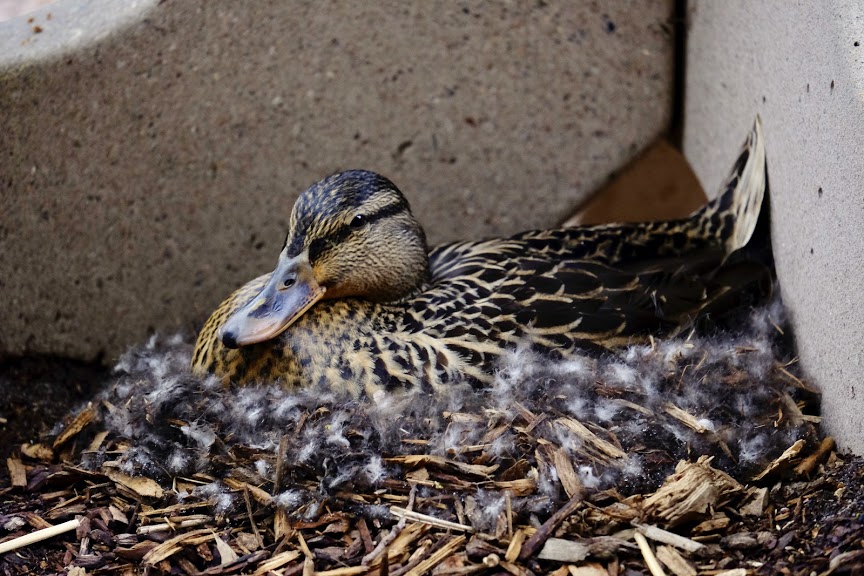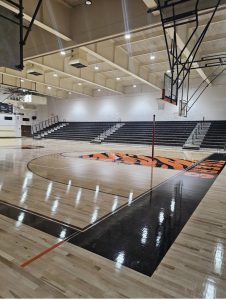More Mallards Set to Graduate from Tenafly High School
Mallard nesting in the Pitt. Photo courtesy of Ella Herman
May 4, 2019
Why is the school courtyard closed? It was a great place for students to spend their free time, eat lunch, or hang out with their friends on a free period. However, it is now a nesting place for a mother mallard. Annually, a mother mallard comes to the school courtyard to build a nest and raise her ducklings. According to English teacher Mr. Whitehead, this has been going on for at least forty years and is now a THS tradition of which the school community has been very supportive. The tradition helps foster a great learning environment in that students are easily exposed to nature, right at school. Anyone can observe the entire process of the birth of ducklings in close proximity, from the building of the nest to the birth of the ducklings.
Recently, another mother bird, the same species as the other one, was spotted walking her ducklings in the Alumni Garden, the courtyard opposite the principal’s office. Without being discovered, the mother bird laid and incubated her eggs, successfully nurturing them into fifteen healthy ducklings. On May 25, the mother and the ducklings were escorted through the hallway and safely made it to the Tenakill brook, becoming the first mallard family to be escorted out in 2019.
Ms. Donna Lewis, who works very closely with the Tenafly Green Team, has overseen this tradition for 15 years. She recalls last year when two ducks came to nest in the school courtyard. She believes that the same duck came back this year and is nesting in our main courtyard. “We are very lucky to have at least one duck, sometimes two, choose to take up a nesting position in one of our courtyards,” said Ms. Lewis. “Last year we had two. One duck came and was in a corner in a little area where there was some ground cover and had her nest. Pretty much as soon as she was finished, the one that we believe has returned this year that’s currently underneath the table in the courtyard, came exactly to the same spot she is now and began to nest. We believe that it is the same duck that we had last year. This has been going on for many many years. It’s a tradition here. For some reason, they decide to take refuge here. They find a nice comfortable spot where they can sit quietly.
“It takes her about three to four weeks to sit on the eggs and for them to hatch. We’re getting really close now. Probably within the next week or so, they’ll hatch and one day we’ll come out and see through the windows anywhere between eight to ten ducklings. Usually she remains there for a little while until the ducklings get their strength, and within a week, she’ll go towards the door, signaling to us that she needs to get out and she knows with her sense of direction or smell which way to go. Students line up in the hallways and we open all the doors so she can feel the wind and the air and know which way to go. Then they go down into the brook and begin their journey in the wild.
“It’s absolutely lovely. I can’t tell you how wonderful it is. It’s just a great experience. It’s a tradition here. It’s obviously not a tradition that’s man-made in any way. Nature decides to interact with us in this way and we’re very very happy to have it—for as long as I’ve been here, and I’ve been here for twenty five years, I don’t recall the 25 years ago that it happened, but I know at least going back fifteen years for sure. What we believe is that sometimes, one of the female baby ducklings will come back because they remember this location. This is probably why we’re getting a continuous experience with this. It’s not just the mother duck, one of her little ducklings also knows the location and views this as a safe place to nest as well. It’s a beautiful story. Everyone here is very respectful, the students are fantastic. They permit us to bolt those doors and put the signs up, a few weeks out of the year. It’s a wonderful experience for everyone to see nature right inside our own campus, and just to be part of it.”
With one mallard now out in the wild, there’s just the mother duck in the outdoor Pitt left. In a week or two, her eggs will hatch and soon the school will open all its doors to bid farewell to another mallard family. The school community is honored and thrilled to have successfully aided two ducks in the process of nurturing several baby ducklings and their transition to the brook. THS looks forward to carrying on the tradition next year and is planning to prepare a more welcoming environment for the mallards.

















































































































































